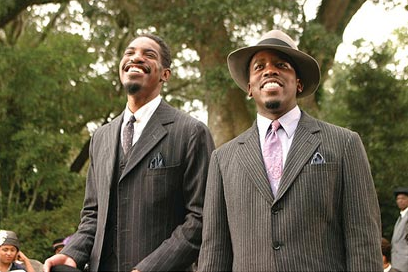One of my best friends burned me a copy of “Idlewild”, the sixth and (possibly) final album from Outkast in late 2006. It was my senior year of high school; at the beginning of my freshman year I had burned my sister’s copy of their record breaking album “Speakerboxxx/The Love Below”. It’s difficult to get a grasp on the career arc of Outkast in 2006. They released “Stankonia” in 2000, an instant classic that made them a more mainstream rap group than ever before. Radio hits like “Ms. Jackson” and “So Fresh, So Clean” offered pop credibility while deep cuts like “Toilet Tisha” and “I’ll Call Before I Come” solidified their position as a leading voice of hip-hop culture in the South. But if “Stankonia” elevated their status in rap music, their follow-up effort made them the biggest act in music, full stop. A one-two punch of “Hey Ya” and “The Way You Move” gave them consecutive Billboard Top 100 singles for over 10 weeks. The ambitious, densely packed double album found Big Boi handling the more straightforward, funk influenced southern hip hop on “Speakerboxxx” and Andre 3000 delving into experimental alt-rap (with lots of singing) on “The Love Below”. The album sold over 11 million copies. After years of paying their dues and gaining a loyal following, the Atlanta duo suddenly found themselves at the summit of their profession. As the success of the album ran its course, the logical question became, “What’s next?”
That copy of “Idlewild” my friend burned me came with an interesting defect: a glitch in his music library made it so the songs were downloaded onto the CD in random order. This can serve as a useful metaphor for the album itself. It was criticized for being disjointed with no clear flow from beginning to end. The song that begins my copy of “Idlewild” is “Life is Like a Musical”. It’s an up-tempo song in 6/8 time; just over 2 minutes long and is sung completely by Andre 3000. The lyrics are a sort of State of the Union of Outkast as a group. “Idlewild” is a companion album to the film of the same name, which stars Andre 3000 and Big Boi as childhood friends turned adults navigating crooked businessmen and their family lives in the fictional town of Idlewild, GA circa 1935. The movie presents their characters, Percival and Rooster, as leading different lives with different goals. But they are united by their bond and each consistently has the other’s back, even in life or death situations. Is this not simply a projection of their real life personas? In “Life is Like a Musical”, Andre sings:
I called Big Boi on the telephone
I said “hey hold up ‘fore we put out another song”
Say no matter what goes down we stand strong
Cause ain’t nothin changed (it’s simple)
The confirmation of different agendas but mutual love was a theme of Outkast by this point, a theme that continues today. Even with “Speakerboxxx/The Love Below” there were rumors of discord in regards to the musical direction each wanted to take, leading to a double album where each could stretch their legs without the other’s interference. Dre and Big Boi repeatedly denied these rumors in the press, and also through their songs. Here’s another line, this time from Big Boi, on the Idlewild track “Morris Brown” :
And everybody wanna know what’s really goin’ on
Is you and 3000 still makin’ songs?
So on and so on
I can go o-on and o-on
And on, and on, and on
Hell yes!
Here we see another theme in the days since “Idlewild”— confirmation that Outkast are still working on music together, but with no music in sight. They headlined the Coachella music festival together in 2014, bringing hope. A brief tour followed, but it’s been 10 years since “Idlewild’s” release, and despite rumors and a few one-off tracks, no new project has materialized.
But where does “Idlewild” itself rank within Outkast’s catalog? Musically, it’s as ambitious as any album they ever produced. There’s a lot of blues guitar on this record, with songs like “Idlewild Blue (Don’tchu Worry ‘Bout Me)” sounding like an homage to Robert Johnson or Blind Lemon Jefferson. The best song on the album is “Hollywood Divorce”, which features a brilliant Lil Wayne verse riffing on the devastation caused by Hurricane Katrina and Hollywood’s appropriation of hip hop culture. “Buggface” sounds like a 90’s era Prince outtake. Ultimately, the clashing instrumental styles work against “Idlewild”; it’s not a record that has a clear direction or tone. Despite this, I have a soft spot in my heart for this album. There are a lot of good songs here that offer the best of what this group has done over two (now three) decades. I can’t imagine that Dre or Big Boi envisioned it as their swan song, but rather another step in their progression or a project that would maybe spark inspiration for more music. As a fan waiting for their next move, “Idlewild” is good enough to go back to for repeat song listens, but only increases the appetite for more Outkast brilliance should it ever come.

